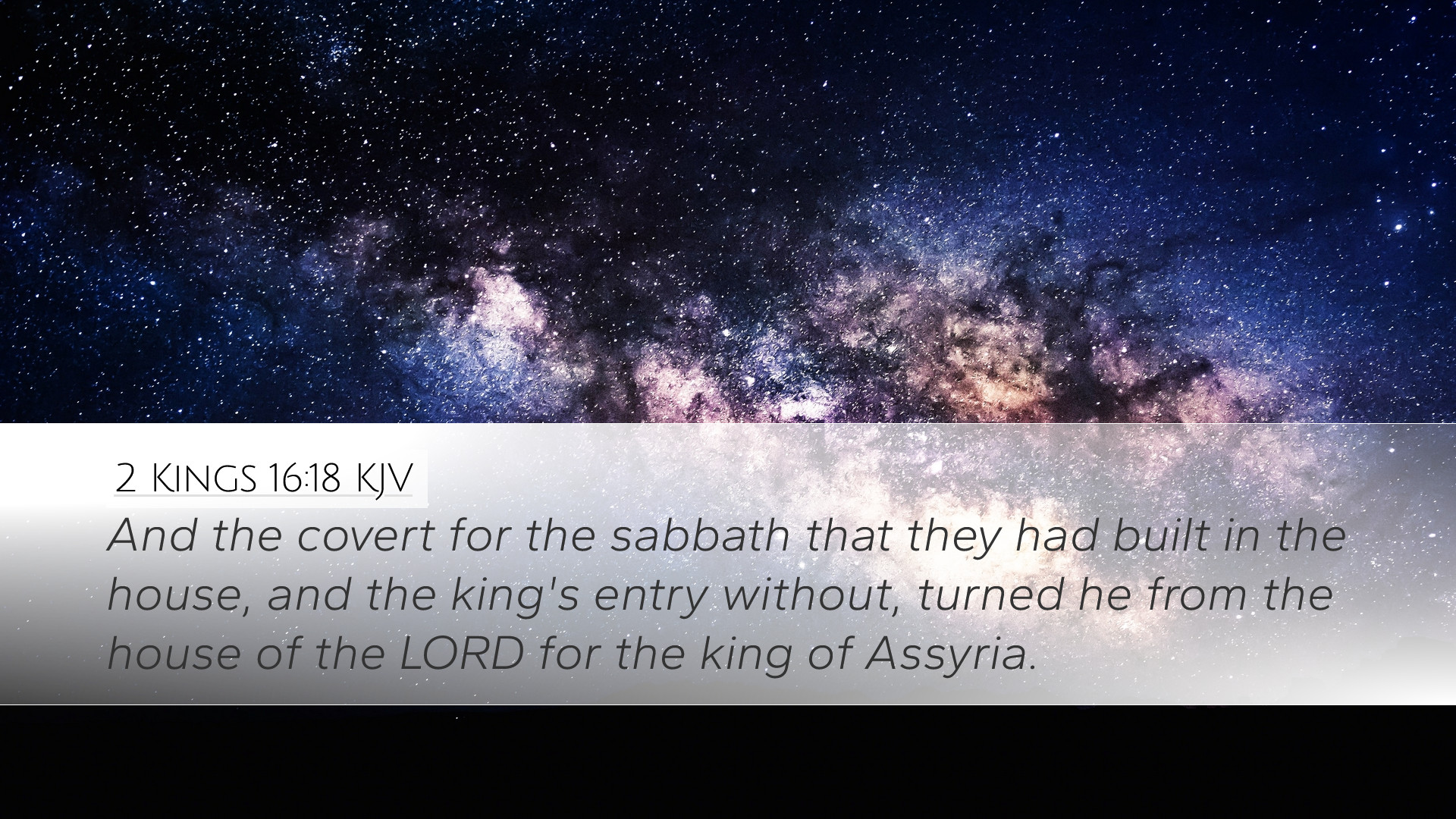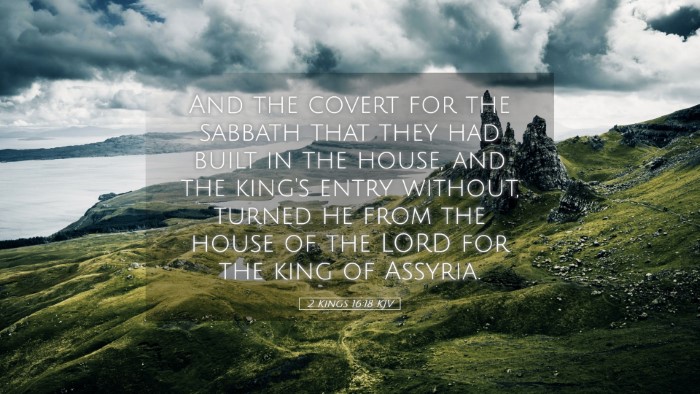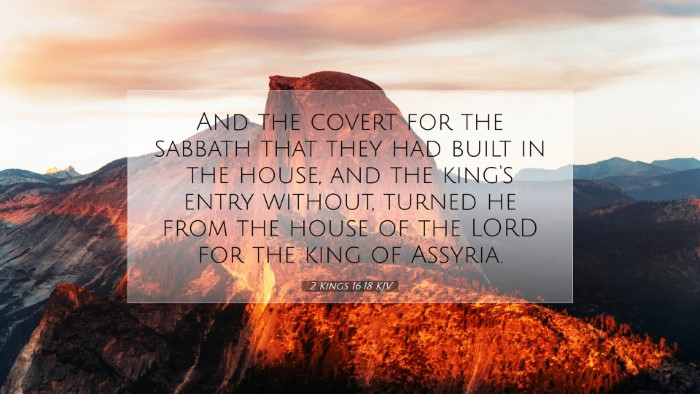Old Testament
Genesis Exodus Leviticus Numbers Deuteronomy Joshua Judges Ruth 1 Samuel 2 Samuel 1 Kings 2 Kings 1 Chronicles 2 Chronicles Ezra Nehemiah Esther Job Psalms Proverbs Ecclesiastes Song of Solomon Isaiah Jeremiah Lamentations Ezekiel Daniel Hosea Joel Amos Obadiah Jonah Micah Nahum Habakkuk Zephaniah Haggai Zechariah Malachi2 Kings 16:18
2 Kings 16:18 KJV
And the covert for the sabbath that they had built in the house, and the king's entry without, turned he from the house of the LORD for the king of Assyria.
2 Kings 16:18 Bible Commentary
Bible Commentary on 2 Kings 16:18
Verse: 2 Kings 16:18 - "And the covered way that was built in the house of the LORD, and the king's entry without, turned he aside from the house of the LORD for the king of Assyria."
Introduction
This verse, nestled within the narrative of King Ahaz’s reign over Judah, provides a glimpse into a crucial moment of spiritual decline and political maneuvering in the history of Israel. It reflects the choices and the resultant spiritual implications for the nation during a time of crisis.
Contextual Overview
Ahaz, one of the kings of Judah, ruled during a tumultuous period characterized by threats from neighboring kingdoms. His decision-making was heavily influenced by the geopolitical climate, particularly the looming power of Assyria. This chapter outlines how Ahaz, rather than relying on God, turned to Assyria for help, thereby compromising the worship and practices established in the temple.
The Significance of the Covered Way
The term "covered way" refers to a corridor or pathway that provided a connection to the temple, emphasizing the significance of worship and access to God. The alteration of this path highlights a spiritual transformation—Ahaz was distancing himself from the worship that had traditionally occurred there.
Matthew Henry's Insight
Matthew Henry emphasizes the gravity of Ahaz's action, noting that the alterations made to the temple were not merely architectural but profoundly symbolic. Ahaz's adjustments to the temple signify a departure from true worship and a shift toward pagan influences, aligning himself with the practices of Assyria. Henry warns that such compromises can lead to the corruption of worship and the neglect of God’s commandments.
Albert Barnes' Perspective
Albert Barnes further elaborates on the implications of foreign influence over sacred spaces. He points out that Ahaz’s decision to alter the king's entry to accommodate the king of Assyria illustrates a prioritization of political alliances over faithfulness to God. Barnes underscores that this act was indicative of a declining morale in spiritual matters and suggests that the integrity of worship and the relationship with God were severely compromised as a result.
Adam Clarke's Commentary
Adam Clarke draws attention to the metaphorical significance of the changes made by Ahaz. He interprets the 'turning aside' as a deliberate choice to forsake the worship of Yahweh. Clarke provides a historical context by discussing the religious reforms that had occurred prior to Ahaz’s reign, illustrating that these changes were a regression from the reforms of earlier kings who sought to rid the land of idolatry. This regression signifies a broader trend in Judah toward idolatrous practices that would ultimately culminate in disaster.
Spiritual Lessons
- The Danger of Compromise: The actions of Ahaz teach that aligning oneself with worldly powers can result in spiritual compromises that have lasting impacts on the community of faith.
- The Importance of True Worship: The modifications to the temple remind us that the nature of worship must remain unadulterated and focused on God, lest it become merely a tool for political ends.
- Faith Over Fear: Ahaz’s choice indicates a failure to trust God's sovereignty in times of trouble. Pastors and leaders are reminded to guide their communities toward faith in God rather than reliance on secular powers.
- Historical Precedents of Reformation: The text encourages church leaders and theologians to reflect on past revivals and reformations, and to strive to maintain the purity of worship practices in their communities.
Conclusion
2 Kings 16:18 serves as a sobering reminder of the consequences of straying from the path of worship and reliance on God. The alterations made by King Ahaz reflect not just a political decision but a profound spiritual choice that would lead to significant ramifications for Judah. In its essence, this verse challenges theologians, pastors, and scholars to consider how modern-day believers might similarly falter by compromising their faith in pursuit of worldly alliances. It calls for a deep, introspective inquiry into the nature of our worship practices and the influences that shape them.


